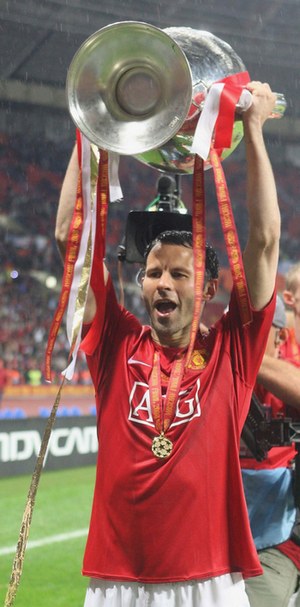Story
Ryan Giggs: At home in Europe
 As the UEFA Champions League's leading appearance-maker, Ryan Giggs tops the bill in a competition that perfectly showcased his incredible career...
As the UEFA Champions League's leading appearance-maker, Ryan Giggs tops the bill in a competition that perfectly showcased his incredible career...
May, 1993. Bedecked in a black and white striped jacket as baffling as one of his full-pelt touchline slaloms, Giggs emerged from United's dressing room to find a cluster of reporters eager for soundbites.
Having barely engaged the media during his early days around United’s first team, the 19-year-old gave in to the party mood - having just scored in a 3-1 victory over Blackburn as the Reds were crowned champions for the first time in 26 years – and duly obliged.
The interview lasted for four questions and fell shy of two minutes, yet the youngster was in lucid mood. Asked if he was looking forward to playing in the European Cup, Giggs responded: “Yes. It can only bring out the best in a player when you’re able to play the greatest teams in Europe.”
Over the ensuing two decades, the Welshman validated his own estimate, reserving some of his finest displays for Europe’s grandest club competition. While the country’s record, 13-time champion starred in the Premier League’s soap opera from its inception, the Champions League provided the perfect stage for his talents to bathe in the burning midweek floodlights.
From the off, he thrived. There have been grander settings than Budapest’s rain-sodden Jozsef Bozsik Stadium, but even there, Giggs shone. In United’s first top level European attack in 24 years, he registered an assist for Roy Keane, and latterly bagged another for Eric Cantona. Under UEFA’s cumbersome ‘foreigner’ rules of the time, Giggs fell into the ‘assimilated player’ category, yet, when fit, he was selected every time.
The altogether more experienced Peter Schmeichel, Denis Irwin, Mark Hughes and Andrei Kanchelskis were all rotated as the manager juggled his non-English talents. Not Giggs.
“Some players can take it - it's what they strive for,” the boss said of the Champions League, and he sought to ensure that all his players – young and old – quickly adapted to the competition’s rigours in their next away trip; the now-infamous journey to ‘Hell’ to face Galatasaray.
For Giggs, even two decades on, the experience remains a perfectly preserved reference point which has always stood him in good stead. "I remember it vividly,” he says. “When we arrived at the airport, there were all the banners and thousands of fans screaming at you. There were things thrown at us, fans outside the hotel chanting all night making sure we didn't get any sleep and people phoning the hotel rooms. It had everything. The atmosphere was something I tried to enjoy as much as I could.”
Giggs’ maiden campaign ended in Istanbul, but his next European outing, 1994’s group stage opening victory over IFK Gothenburg, yielded two goals and the Daily Star’s declaration: “Giggs looks determined to take the European stage by storm.” Injury would hamstring those ambitions, punctuating the following three seasons and reducing the Welshman to sporadic outings.
He sat out half the group stage campaign in 1994/95, missed home and away meetings with Fenerbahce in 1996/97 and was hampered by the need for double hernia surgery throughout both semi-final appearances against Borussia Dortmund later that term. A year on, he missed both legs of the Reds’ shock quarter-final exit to Monaco with hamstring trouble.
Nevertheless, promise poured from Giggs’ outings when he featured. The 1996/97 term yielded the vital opening goal in an invaluable matchday six win at Rapid Vienna, before a quarter-final, first leg display against Porto which announced his glaring talent to Europe. In an unlikely central midfield role, in an even unlikelier 4-0 victory, Giggs’ contribution prompted his manager to gush: “Ryan was unbelievable. The boy is maturing now. It was a wonderful performance from him, marvellous.”
That outing is still cited as one of the winger’s finest in almost a thousand United appearances, but it was run close later that year by another storming display in a 3-2 group stage win over Marcello Lippi’s Juventus. Word was spreading. “He’s a player of unquestionable talent,” said Juve’s Zinedine Zidane, while Internazionale’s Ronaldo marvelled: “Giggs is so unpredictable.”
The side effects of such contributions would prove costly, though. “In big, high-tempo European games where I played well, I’d suffer for it afterwards,” the Welshman revealed, and it was no coincidence that the enlistment of Jesper Blomqvist as an able deputy accorded with United’s first successful tilt at the Champions League.
The Welshman enjoyed his most fruitful European return in the 1998/99 Treble season, scoring the first goal of the campaign against LKS Lodz, hitting two against Brondby and one against Barcelona in the group stage, before a life-preserving semi-final, first leg leveller against Juventus. Giggs missed the return victory in Turin, but recovered for the final against Bayern Munich, where his injury-time shank teed up Teddy Sheringham’s scuffed equaliser, seconds before Ole Gunnar Solskjaer’s infamous winner. “It was jaw-dropping. We’d been dead and buried,” recalled the winger.
There would be no reprise of such late drama, however, in United’s defence of the title or subsequent bids to regain it. Skipper Roy Keane admitted it was “the end of the road” for some of United’s players after successive quarter-final exits to Real Madrid and Bayern, and a semi-final shock against Bayer Leverkusen, but Giggs remained a model of consistency on the left flank. “He’s fantastic, I couldn’t ask for more,” said his manager.
Others, however, were less forgiving. Under fire from supporters midway through the 2002/03 campaign, Giggs – who appeared in all-but one of the Reds’ 16 European ties – used the Champions League as a route back to his best form. Not for the first time, Juventus would feel Giggs’ wrath, as a substitute cameo in Turin yielded two goals. The second, a surging run from deep and clinical finish, prompted the winger to point at his name as he bounded over to the jubilant away support. “It came at a peculiar time for me, something of a low point in my career when I’d been getting a bit of stick from some fans,” he admitted. “It had never happened to me before but I think the criticism helped me, made me more determined, encouraged me.”
Approaching his 30th birthday, Giggs began to shoulder a greater burden as Sir Alex embarked on another remodelling of his side. In the space of just over two years, David Beckham made way for Cristiano Ronaldo, Wayne Rooney was introduced and Roy Keane departed, and inevitably, United’s Champions League standing wobbled. Knockout exits to Porto and AC Milan preceded 2005/06’s ill-fated group stage campaign, in which Giggs sustained a fractured cheekbone against Lille and was sidelined for two games, then short of match fitness as United were eliminated in Lisbon.
Amid a scathing post-mortem, ex-Arsenal striker Alan Smith assessed United’s ranks in the Daily Telegraph, writing of Giggs: “After 14 years on the left wing, his legs seem to be saying they can't do much more.” Repurposed as a support striker the following term, Giggs’ experience was utilised to perfection, most notably yielding four assists in United’s seven goal thrashing of Roma. “Ryan has deserved nights like this. He rises to it,” smiled Sir Alex. Though there would be no involvement beyond a semi-final tie with AC Milan, the 2007/08 campaign brought Giggs another concentrated hit of glory.
In a speedy attacking side built around Ronaldo, the wily winger’s usage was sparing. Tellingly, however, he was introduced in place of the tiring Paul Scholes as United battled Chelsea in the competition’s first all-English final. Not only did the outing bring up appearance number 759 and set a new club record; his successful conversion of United’s final penalty teed up a third term as European champions. “It doesn’t get any better,” Giggs grinned afterwards.
It came close, reaching finals in 2009 and 2011, but defeats to a Barcelona side at their pass-popping zenith took the gloss off swaggering European campaigns. Incredibly, Giggs’ influence grew with each season. Having assisted every goal in the 2011 quarter-final dispatch of Chelsea, it was he who ended the resistance of Schalke goalkeeper Manuel Neuer in the semi-finals, turning home a low-nutmegged finish to exploit the German’s Schmeichel-eque tendency to spread himself. Giggs had been practising those finishes all week. Another assist for Wayne Rooney against Pep Guardiola’s side at Wembley wasn’t enough, however, to bring a happy ending to a fourth final appearance.
A back seat often beckoned as Sir Alex opted to blood youngsters throughout the ill-fated 2011/12 campaign and last term, when the burgeoning talents demonstrated that lessons had been learned. Nevertheless, Giggs’ experience brought him a starting berth in the biggest tie of all; a second round, second leg clash with Real Madrid at Old Trafford which provided the platform for the Welshman’s 1,000th professional appearance. “Nothing but the best for the best,” said Sir Alex, before the 39-year-old stole the show as the game’s outstanding player.
In the 2013/14 draw in Donetsk, Giggs’ one-man quest to fill the record books continued with the overtaking of Raul to become the Champions League’s record appearance-maker. “It means a lot," said Ryan. "It’s the pinnacle of European football.” A rip-roaring performance a 3-0 win over Olympiacos followed, prompting The Daily Telegraph's Henry Winter to write: “On this evidence, Giggs should put aside any thoughts of retirement.” Alas, his final outing arrived during a 1-1 draw with Bayern Munich to bring down the curtain on a remarkable Champions League career. After two decades of show-stealing excellence, there is nobody better to adorn its very peak.
Report by Steve Bartram, ManUtd.com


